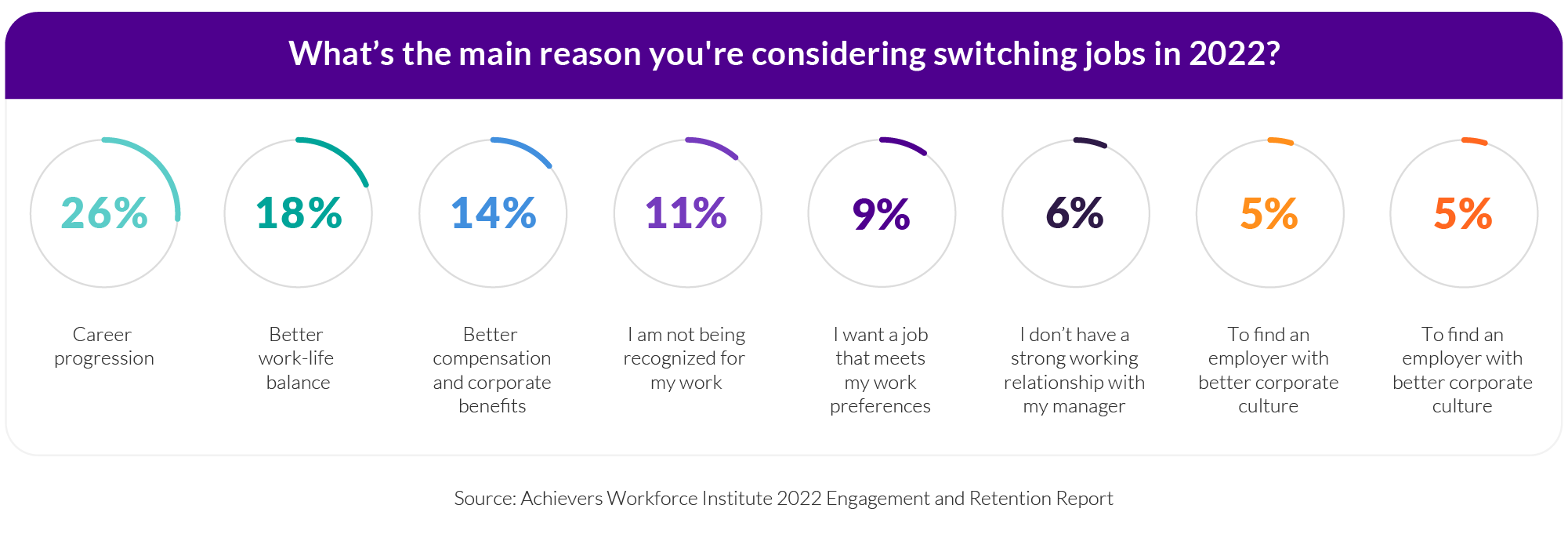Create a culture that means business™
Email address
Three-quarters of HR leaders are worried about the coming recession, according to the latest research from the Achievers Workforce Institute.
Attracting, engaging, and retaining the right employees will increase the likelihood of success. Preparing for this looming recession requires that HR leaders invest in their people more than ever. By building an HR strategy that centers on employee engagement, organizations will be well set up to survive and thrive through the challenges ahead.
When HR leaders were asked how they were preparing for the possible recession, the top three answers were:
- Initiatives to improve productivity
- Focus on high priority hires
- Initiatives to improve retention
However, 15% said they were doing nothing to prepare for a possible recession, meaning one in six companies could be left behind if the economic predictions come to pass.
Looking at each of these in turn, there is a lot that HR can do to move the needle on productivity, attraction, and retention.
Improve productivity
Organizations are getting leaner. Asked how they were preparing for a possible recession, the #1 answer from HR leaders was a focus on initiatives to improve productivity. There’s no question that enhancing productivity is top of mind for employers, who are looking for high-impact ways to do more with less.
That said, productivity is difficult to measure, making it hard to meaningfully impact. In this research, AWI asked individual respondents to rate their own productivity. One quarter say they are their most productive selves at work, with 66% rating themselves as moderately productive, and 9% saying they were unproductive at work.
4 steps to improve workplace productivity
- Recognition. Recognition frequency correlates strongly with high productivity — the more often someone is recognized the more likely they are to report being highly productive.
- Feedback. Employees who say their organization takes meaningful action on feedback are almost three times more likely to say they are their most productive selves at work.
- Connection. Employees who say their company supports them in creating and maintaining friendships at work are 2.6 times more likely to report being their most productive selves at work.
- Manager effectiveness. People who would recommend their managers are 2.1 times more likely to report being highly productive.
Attract high priority hires
41% of respondents said they would job hunt this year, according to the 2022 Engagement and Retention report. When asked the main reason they would consider leaving, career progression topped the list of reasons why.

Opportunities for growth and development are crucial to candidates. Ensure your employer brand emphasizes growth and have clear career paths for every job level.
Improve retention of top talent
Keeping and engaging the talent you have is critical for success. Once you have attracted the best, how can you ensure they want to stay with you?
According to the 2022 Engagement and Retention Report, the #1 reason employees choose to stay with a company is work-life balance.
Flexibility is more than just a buzzword. It’s something employees are increasingly demanding — and it’s not just for online workers who can operate from coffee shops at any time of day. In the recent 2022 Culture Report, offline workers were just as likely to prioritize flexibility.
At its core, work flexibility is about empowering employees to have fulfilling work and home lives. It’s about respecting that employees have a life outside work and enabling them to meet their personal needs. Whether that means flexible hours and location for online workers, or set shifts and personal leave for offline workers, employers must find ways to offer a consistent experience of flexibility for all their employees.
Productivity, attraction, retention
As employers navigate the challenging waters ahead, HR must focus on operating with lean teams, driving results, and attracting and retaining top talent. From tools such as recognition and feedback, to career opportunities and flexible work, employees are no longer willing to compromise on the things that matter most to them.



